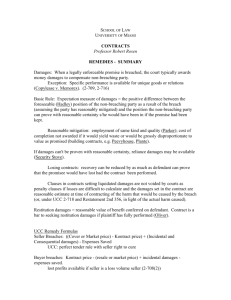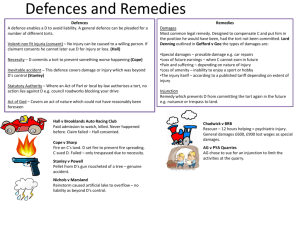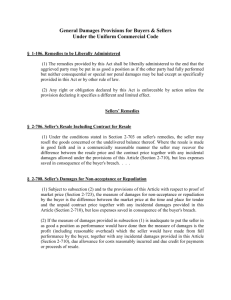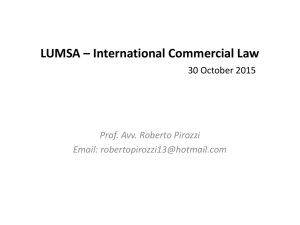LUMSA – International Commercial Law INCIDENTAL DAMAGES
advertisement
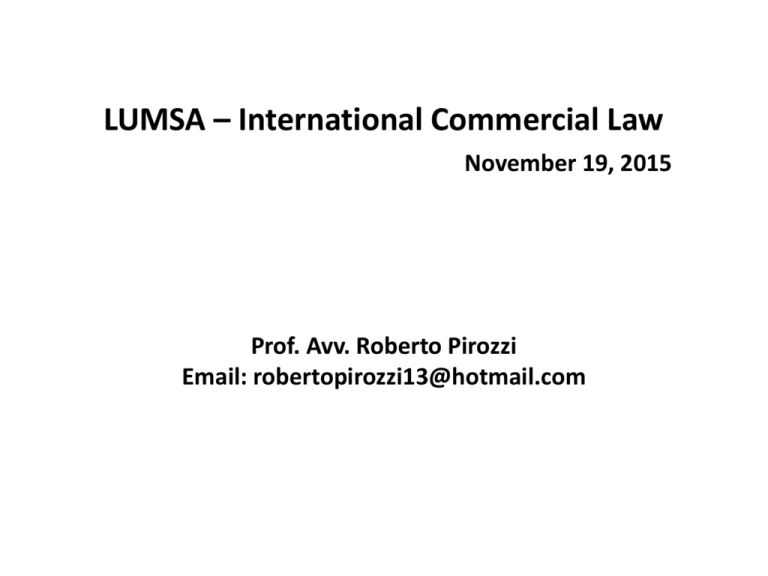
LUMSA – International Commercial Law November 19, 2015 Prof. Avv. Roberto Pirozzi Email: robertopirozzi13@hotmail.com LUMSA – International Commercial Law DAMAGES Article 74 sets forth the general principle by which the CISG measures liability for breach: “Damages for breach of contract by one party consist of a sum equal to the loss, including loss of profit, suffered by the other party as a consequence of the breach. Such damages may not exceed the loss which the party in breach foresaw or ought to have foreseen at the time of the conclusion of the contract, in the light of the facts and matters of which he then knew or ought to have known, as a possible consequence of the breach of contract.” LUMSA – International Commercial Law DAMAGES The basic CISG formula is quite simple: damages for breach of contract are designed to compensate (and are thus measured by) the loss suffered by the other party as a consequence of breach. Assuming a causal connection between the breach and the loss, the Convention scheme seeks to place the injured party in the position he would have enjoyed if the breach had not occurred. Like the remedy of specific performance, substitutionary relief serves to protect the promisee's expectation of full performance, i.e., his or her 'expectation interest. LUMSA – International Commercial Law DAMAGES General rules for measuring damages are recited in Article 74 CISG. Cross-references to this provision include: Articles 45(1)(b) and 61(1)(b) which establish the right to claim damages; Articles 75 and 76 which define methods of calculating damages in certain cases; Article 77 containing the rule of mitigation of damages; LUMSA – International Commercial Law DAMAGES General rules for measuring damages are recited in Article 74 CISG. Cross-references to this provision include: Article 79 setting forth the rules on exemption from liability for damages because of an impediment to performance; and Article 78 which provides that a claim for interest shall be "without prejudice to any claim for damages recoverable under article 74." LUMSA – International Commercial Law DAMAGES Articles 4 and 5 can also affect claims for damages: Art. 4 (sentence one) limits such claims to those of the buyer and the seller; Art. 4(a) by virtue of its validity proviso can, in certain cases, permit domestic law to determine the validity of exculpatory clauses such as contract clauses that exclude liability for damages; and Art. 5 indicates that the CISG does not apply to damage claims "for death or personal injury caused by the goods to any person." LUMSA – International Commercial Law DAMAGES Other general provisions of the CISG relating to damages include: Art. 6 (primacy of the contract); Art. 7 (interpretation of the CISG, applicability of its general principles); Art. 8 (intent of the parties); and Art. 9 (usages and practices). See also, Art. 66 (loss or damage after risk passed to buyer) and Art. 80 (failure of performance caused by the other party). The CISG also imposes requirements such as those regarding the preservation of the goods (Art. 85 through 88) under which claims for damages can arise. LUMSA – International Commercial Law DAMAGES - NOTE In accordance with article 6 a seller and buyer may agree to derogate from or vary article 74. Several decisions enforce contract terms limiting or liquidating damages. The validity of these contract terms is, by virtue of article 4 (a), governed by applicable domestic law rather than the Convention. LUMSA – International Commercial Law DAMAGES – SELLER’S REMEDY In addition to money damages under Art. 61(1)(b), an aggrieved seller may require performance under Art. 62, fix an additional time for performance under Art. 63, avoid or cancel the contract under Art. 64, or have goods identified to the contract under Art. 65. In addition to any of these remedies, seller may seek consequential damages under Art. 74. LUMSA – International Commercial Law DAMAGES – BUYER’S REMEDY An aggrieved buyer, in addition to damages under Art. 45(1)(b), may require performance or substitute performance under Art. 46(2), demand repair of defective goods under Art. 46(3), fix an additional period of time for performance under Art. 47, accept seller's cured performance under Articles 48 and 37, avoid or cancel the contract under Art. 49, or reduce the sales price under Art. 50. In addition to these remedies, buyer may seek consequential damages under Art.74. The right to all remedies for lack of conformity of the goods, including claims for damages, is related to the inspection requirement recited in Art. 38 and subject to compliance with the notice requirement recited in Art. 39. LUMSA – International Commercial Law DAMAGES Under CISG Article 74, only foreseeable consequential damages are recoverable. There is no mention of incidental damages. Nothing in the legislative history of the CISG suggests an intention to abolish incidental damages. Damages which would be characterized as incidental in other legal systems should be recoverable as consequential damages under the CISG. It seems, however, that only foreseeable incidental damages are recoverable under Article 74 as consequential damages. LUMSA – International Commercial Law CONSEQUENTIAL AND INCIDENTAL DAMAGES Under CISG Article 74, only foreseeable consequential damages are recoverable. There is no mention of incidental damages. Nothing in the legislative history of the CISG suggests an intention to abolish incidental damages. Damages which would be characterized as incidental in other legal systems should be recoverable as consequential damages under the CISG. It seems, however, that only foreseeable incidental damages are recoverable under Article 74 as consequential damages. LUMSA – International Commercial Law FORESEEABILITY CISG’s Foreseeability Test is both subjective and objective. Liability is based on what a party foresaw, AND liability is based on what a party “ought to have foreseen.” Note: the test should not be based on the reasonable person, but rather on the reasonable foreseeability of the non-performing party. “[T]he loss which the party in breach … ought to have foreseen. LUMSA – International Commercial Law DAMAGES The Convention only allows monetary damages. Article 74 states that “Damages…consist of a sum equal to the loss,…”. Even though it is clear that the Convention provides for damages for loss, including loss of profit, it is not entirely clear which losses shall be compensated since they are not specified in the Convention. When considering a loss there are two opposite principles that one shall keep in mind; the principle of full compensation and the rule of foreseeability, which functions as a limit to the first principle. LUMSA – International Commercial Law DAMAGES Once decided that a loss shall be compensated the question is where it shall be paid. This is not expressed in the Convention but it can be assumed that it shall be at the same place as where the price is payable according to Article 57(1)(a), namely at the obligee’s place of business. This is also in accordance with the general principles in Article 7(2). LUMSA – International Commercial Law DAMAGES As a rule, non-material losses will not be compensated. According to Prof. Schlechtriem this is a rule with exceptions. If a contract has a non-material purpose and the nonmaterial loss is to be considered a typical consequence of a breach of this specific contract it may be compensated. It also has to be shown that both parties understood the purpose of the contract by the time of its conclusion. LUMSA – International Commercial Law DAMAGES Example: the case where the purpose of a contract for the sale of a motor vehicle is to enable the buyer to undertake a holiday trip. If the seller does not perform according to the contract he may be held liable also for non-material losses. Foreseeable damages shall then be compensated as consequential damages. LUMSA – International Commercial Law DAMAGES As mentioned above, a breaching party is only liable if there is an actual loss that can be proven and a causal relation between the breach and the loss. It is irrelevant whether the damage is caused directly or indirectly by the breach. However, it can be more difficult to prove and foresee an indirect loss. LUMSA – International Commercial Law CONSEQUENTIAL DAMAGES Any loss due to a breach of contract is normally compensated as consequential damages according to the wording of Article 74. By definition, consequential damages compensate those losses that flow from the particular situation of the particular contract. A typical example of this kind of loss is when a breach of the seller results in liability for the buyer as he has agreed on reselling the same goods to a third person. LUMSA – International Commercial Law CONSEQUENTIAL DAMAGES TO THE BUYER In this situation the first seller may be held responsible for the first buyer’s liability if he knew that the goods where to be resold. Even in the case that a buyer suffers a loss of goodwill, because of defective goods, this loss may be compensated as a consequential loss according to Schlechtriem. This statement can be debated. If it is to be compensated the buyer must have made the risk of this type of loss clear to the seller before concluding the contract. As I see it the principle of full compensation is pro compensation for lost goodwill but against is the difficulty of quantifying such a loss LUMSA – International Commercial Law CONSEQUENTIAL DAMAGES TO THE SELLER A seller can also suffer consequential loss and this often happens in the case of delay of payment. In a LG Aachen, 3 April 1990, where a seller had prefinanced the sale, and the buyer did not pay on time, the court awarded the seller damages corresponding to the interest incurred by him as a result of the delay. LUMSA – International Commercial Law CONSEQUENTIAL DAMAGES TO THE SELLER In another German case, the buyer did not pay the price since he, wrongfully, claimed that the goods were not as per the contract. Because of this, the seller could not use the monies owing and the court awarded the seller damages, corresponding to the interest on the money owed, to compensate his loss. Costs for actions taken by the seller to receive payment, i.e. contracting a collecting agent, shall also be recovered as damages if it contributes with legal proceedings that are superior to those of the seller. LUMSA – International Commercial Law CONSEQUENTIAL DAMAGES TO THE SELLER Apart from these losses of interest and profit caused by delay in payment a seller can suffer a loss because of a fall in the rate of exchange during the period of delay. Claims for compensation for such a loss shall only be recognised where the seller can prove an actual loss. LUMSA – International Commercial Law CONSEQUENTIAL DAMAGES When judging in cases concerning consequential damages one should bear in mind that, in general, it is easier for a seller to borrow substitute capital, for a certain cost of interest, than it is for a buyer to find substitute goods. Because of this the seller ought to be able to prevent consequential damages easier than a buyer. LUMSA – International Commercial Law CONSEQUENTIAL AND INCIDENTAL DAMAGES Article 74 does not mention incidental damages. Incidental damages are expenses incurred when the aggrieved party tries to avoid further disadvantages from a breach. They may arise from various situations and are recovered as consequential damages under the same condition of foreseeability. Despite this, it seems like the court in the Delchi case argued for consequential and incidental damages separately. LUMSA – International Commercial Law CONSEQUENTIAL AND INCIDENTAL DAMAGES In this case an Italian buyer claimed damages from an American seller due to the fact that the compressors for air conditioners ordered had lower cooling capacity and consumed more power that agreed on. When determining if an expense, for Delchi due to the breach, was a foreseeable damage they did it to see if it legitimated incidental RU consequential damage. The reason for this is probably that the two are separated in US contract law and incidental damages do not have to be foreseeable to be compensated. LUMSA – International Commercial Law INCIDENTAL DAMAGES Further examples on incidental damages are cost for the seller of tendering the goods in vain and seller’s preserving and storing goods as a result of buyers rejection of goods or refusal to make payment on delivery according to contract. Apart from above a breaching party is liable for the injured party’s expenses of ascertaining the damage, avoiding it or mitigating it. Costs for ascertaining damages may be costs for inspection of the goods and according to Schlechtriem, these costs shall be compensated as incidental damages. LUMSA – International Commercial Law INCIDENTAL DAMAGES As mentioned a party may be awarded damages for costs arising when trying to mitigate his loss. In the Delchi-case, the buyer was awarded compensation for trying to avoid damages, although the attempts failed. This is also according to US Contract law.


